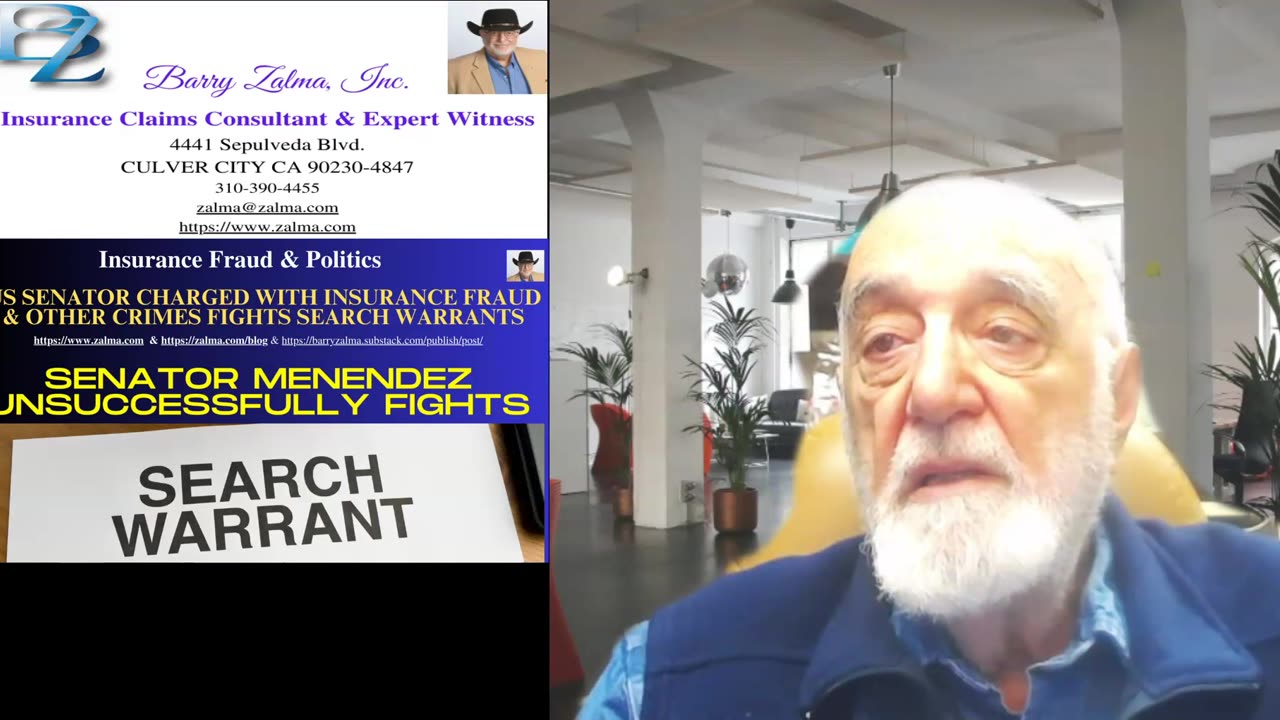Premium Only Content

Insurance Fraud & Politics
US Senator Charged with Insurance Fraud & Other Crimes Fights Search Warrants
Post 4751
In United States Of America v. Robert Menendez, Nadine Menendez, Wael Hana, Jose Uribe, and Fred Daibes, No. S2 23-CR-490 (SHS), the United States District Court, S.D. New York (March 4, 2024) dealt with attempts to defeat the search warrants that found evidence that Senator MenendeZ, (D. New Jersey) was involved in selling favors for a foreign country.
Defendant Robert Menendez (“Menendez”) moved for (1) a Franks hearing to assess allegedly material misstatements and omissions in certain of the government's search warrant applications and (2) an order suppressing evidence from additional warrants seeking electronically stored information on the grounds that they are “general unconstitutional warrants.”
BACKGROUND
The years-long investigation that led to the indictment in this action involved the issuance of numerous search warrants for both physical locations and electronic devices or accounts. Menendez challenges a subset of the warrants.
Menendez challenges the three warrants on the grounds that the warrants were “riddled with material misrepresentation and omissions that deceived the authorizing magistrate judge.”
CONSTITUTIONAL LAW
The Fourth Amendment to the U.S. Constitution provides that “no Warrants shall issue, but upon probable cause, supported by Oath or affirmation, and particularly describing the place to be searched, and the persons or things to be seized.” U.S. Const. amend. IV. Thus, a warrant may not be issued unless probable cause is properly established and the scope of the authorized search is set out with particularity.
With respect to intentionality, the reviewing court must be presented with credible and probative evidence that a misstatement or omission in a warrant application was designed to mislead or was made in reckless disregard of whether it would mislead.
The evidence supported probable cause as to Menendez's involvement. Within two hours of the call from Menendez's office to the official, Hana texted Nadine asking for her address. Only a few days later, Nadine also texted Hana, “I'm so excited to get a car next week. !!” In addition, the affidavit cites a message from Nadine to Hana indicating that Nadine had forwarded the materials related to Egypt to Menendez. In summary, the warrant application amply satisfied probable cause and adding any omitted information contained in the CS transcript would not alter that determination.
TH JUNE MENENDEZ HOME WARRANT
Contrary to Menendez's assertion, the Second Affidavit includes additional evidence supporting probable cause, including messages from Uribe asking Hana for help disrupting a New Jersey investigation. Therefore, as with the January 2022 Menendez ESI Warrant, the Court denied Menendez's request.
The court concluded that the omissions are not material: the inclusion of this additional information would not change the probable cause determination. The New Jersey Defendant, the jeweler, and the testing company owner are all alleged beneficiaries of the bribery scheme. The fact that beneficiaries of an alleged scheme denied their involvement or knowledge after the fact when questioned by a government agent is not sufficient to overcome the significant contemporaneous evidence supporting probable cause that is otherwise present in the Third affidavit.
Menendez has not provided any evidence-and there is no basis to infer-that the omissions were intentionally or recklessly misleading. Indeed, the government only learned the relevant information on the same day that the warrant was sought, which casts significant doubt on the claim that its omission was designed to mislead.
Accordingly, each of the omissions does not meet the materiality threshold. Moreover, the combined, cumulative effect of the omissions raised by Hana - including those that were also raised by Menendez - does not rise to the level of the substantial preliminary showing required for a Franks hearing.
THE WARRANTS ARE NOT UNCONSTITUTIONALLY OVERBROAD
The court found that the Menendez Warrants satisfied the requirements of particularity. Menendez also took issue with the breadth of iCloud account collections, but it is well settled that the government may seize the entire contents of electronic accounts in order to search for relevant evidence.
In sum, the Menendez Warrants are not violative of the requirements of the Fourth Amendment.
CONCLUSION
Menendez's Motion to Suppress Search Warrant Returns was denied. Additionally, the challenged Menendez Warrants do not violate the Fourth Amendment's particularity requirement.
ZALMA OPINION
When a United States Senator engages in acts to protect a person committing insurance fraud and providing assistance to the Country of Egypt was subject to search warrants that allowed the search of his home and seizure of evidence of his fraud and inappropriate conduct to favor, for a fee, the concerns of a foreign country. He attempted to have the search warrants eliminated and the seizure of evidence during the searches conducted and that attempt clearly failed. This case establishes, among other things, that insurance fraud is committed by every race, religion, gender, national origin, wealth, or service in public office is rampant and in this one, rare case, has resulted in an arrest.
(c) 2024 Barry Zalma & ClaimSchool, Inc.
Please tell your friends and colleagues about this blog and the videos and let them subscribe to the blog and the videos.
Subscribe to my substack at https://barryzalma.substack.com/publish/post/107007808
Go to Newsbreak.com https://www.newsbreak.com/@c/1653419?s=01
Go to X @bzalma; Go to the podcast Zalma On Insurance at; Go to Barry Zalma videos at Rumble.com at https://rumble.com/c/c-262921; Go to Barry Zalma on YouTube- https://www.youtube.com/channel/UCysiZklEtxZsSF9DfC0Expg.
Go to the Insurance Claims Library – https://lnkd.in/gwEYk
-
 LIVE
LIVE
Film Threat
17 hours agoVERSUS: DAREDEVIL: BORN AGAIN + MICKEY 17 + THE STATE OF SCI-FI | Film Threat Versus
155 watching -
 LIVE
LIVE
The HotSeat
1 hour agoIt's A Trap America! Do Not Fall For It!
671 watching -
 1:26:22
1:26:22
The Quartering
3 hours agoTrump In Dubai, Democrats BUSTED Funding Attacks On Tesla, DOGE Covid BOMBSHELL & Bernie Sanders
38.2K38 -
 1:39:57
1:39:57
Russell Brand
5 hours agoTYRANNY In Europe as Romanian Right-Wing Presidential Frontrunner BANNED from Elections – SF550
112K33 -
 1:18:36
1:18:36
vivafrei
6 hours agoMark Carney - Newly Anointed Prime Minister of Canada! Live with Rebel News' Ezra Levant! Viva Frei
65K41 -
 50:01
50:01
Ben Shapiro
4 hours agoEp. 2154 - Stephen A. Smith ATTACKS Me!
67.3K58 -
 1:20:26
1:20:26
Simply Bitcoin
4 hours ago $3.13 earnedBITCOIN CRASHED TO $78K: This Is When You Buy The Dip!! | EP 1199
43.8K5 -
 1:57:57
1:57:57
The Charlie Kirk Show
4 hours agoPardon Derek Chauvin + Buh-Bye, BLM + Destroy the Deficit | Sen. Scott, Ben Shapiro | 3.10.25
112K53 -
 58:52
58:52
The Dan Bongino Show
7 hours agoThe Left Can't Meme And Can't Win (Ep. 2438) - 03/10/2025
743K1.79K -
 1:01:32
1:01:32
The Rubin Report
5 hours agoTrump Addresses Rumors of Elon Musk & Rubio Clashing in Cabinet Meeting
82.5K38